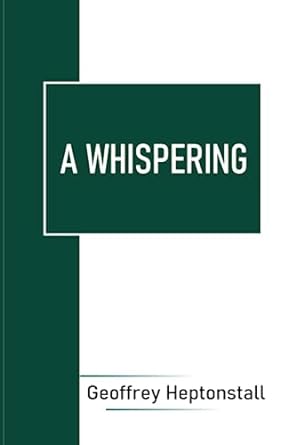
A WHISPERING by Geoffrey Heptonstall
Heptonstall has organized his work into five sections: 1. Down to Earth (9 poems), 2. On Sacred Ground (10 poems), 3. Living in the World (14 poems), 4. Homeward Bound (7 poems), and 5. Whispers (12 poems).
Amazon USAQUILL AND PARCHMENT December 2023 Vol 270
A WHISPERING
by Geoffrey Heptonstall
52 Poems ~ 72 pages
Price: $15.00
Publisher: CYBERWIT
ISBN: 978-8.1-8253-673-9
Reviewed by Michael Escoubas
Geoffrey Heptonstall’s new collection, A Whispering accomplishes more than a mere whisper. It is a “shoutout” to excellent contemporary poetry. As I immersed myself in Heptonstall’s work, another poet came to mind: Wallace Stevens. In one of the seminal poems of the last century, “Notes Toward a Supreme Fiction,” (page 380, The Collected Poems), Stevens cites three hallmarks of poetry: “It Must be Abstract,” “It Must Change,” and “It Must Give Pleasure.” By “Abstract” Stevens means that poetry must challenge the mind, by “Change,” he means that poetry must live in the world as it is, and by “Pleasure,” he means that poetry can and must capture the “joy” of language. To be clear, I’m not suggesting that Heptonstall “writes” like Stevens. I am suggesting that his poetry “trends” toward abstraction, change and pleasure.
Heptonstall has organized his work into five sections: 1. Down to Earth (9 poems), 2. On Sacred Ground (10 poems), 3. Living in the World (14 poems), 4. Homeward Bound (7 poems), and 5. Whispers (12 poems).
In poems such as “Down to Earth,” “An Opening Flower,” and “Earth is Ours,” the poet’s feet stand on solid ground. His poems resonate with love, with respect for the planet on which he dwells. His poetry does not “coddle” the reader. His earthiness challenged my mind. For example “An Opening Flower” begins:
In demeanor frivolous.
The strategy was surely natural,
no more acquiescence to a myth
but an accomplished style displayed,
articulating the hour that comes,
a history of artifice,
exemplary, elegiac and eloquent
when many things are beginning
with a harvest of gilded whispers.
Heptonstall has a way of clothing the “ordinary” with “extraordinary” style. The title word Whispers is salt and peppered throughout the collection. I had fun connecting “whispered” bridges.
Using the poet’s five divisions as a convenient outline, I found smooth transitions. The poet moves with ease from terra firma into sacred intimations of faith and mystery. Consider this excerpt from “Hope Street”:
Yet stranger than we suppose,
the stars shine on the night sea.
Somewhere in the city
they shiver in the shadow of God.
See those mendicant men,
alert as attendant lords,
waiting for the world to turn.
At six o’clock sounds the hour
for the solitary optimist
who walks the moon in search of her.
I appreciate how Heptonstall blends features of the natural world with man’s inner experiences. Nature, through the power of the imagination, mirrors the way we live. I sense an affinity with Stevens, whose poetry explores this theme.
Change comes into play in Section 3, “Living in the World.” Heptonstall is alive in this world. His poetry reflects reality. See “Fragments,” offered here in full:
The care that will repair them
may never be broken
within this handmade world.
In the earthenware hollow,
a resounding echo of ocean.
The fragments lie in the dust
where they fell in slow descent.
In time the line of cutting fades.
but skin shall hide the bone again.
The wound must leave a scar
by a moment’s misfortune.
The jar that held cool water
rests on the ledge with pride.
The poems in this section gently move the reader toward the ending couplet of “Harvest: “After the harvest comes the feasting. / After that, her tenderness.”
Harvest tenderness flows seamlessly into Section 4, “Homeward Bound.” Like many of us, Heptonstall repairs to family memories, experiences which shaped him. One poem is about, “The house they built became my parents’ life.” Another poem “Tending the Vines,” recalls a time “When shadows crossed the sunlit lawns.” Other poems feature seasons ripe with times, “When shadows crossed the sunlit lawns.” Change, uncertainty, even suffering find their rightful place in the solace and pleasure of memories captured poetically.
Heptonstall concludes his collection with “Whispers,” 12 poems that place the capsheaf on the stack. In this set the poet includes references to Paul Verlaine, Charlie Chaplin, Dan Leno (a Vaudeville contemporary of Chaplin), Samuel Becket, Alfred Hitchcock, and the mythical figure Icarus. This inventive and original poet has touched me where …
We sing our lives in a fragile world,
learning the words that will survive us.
